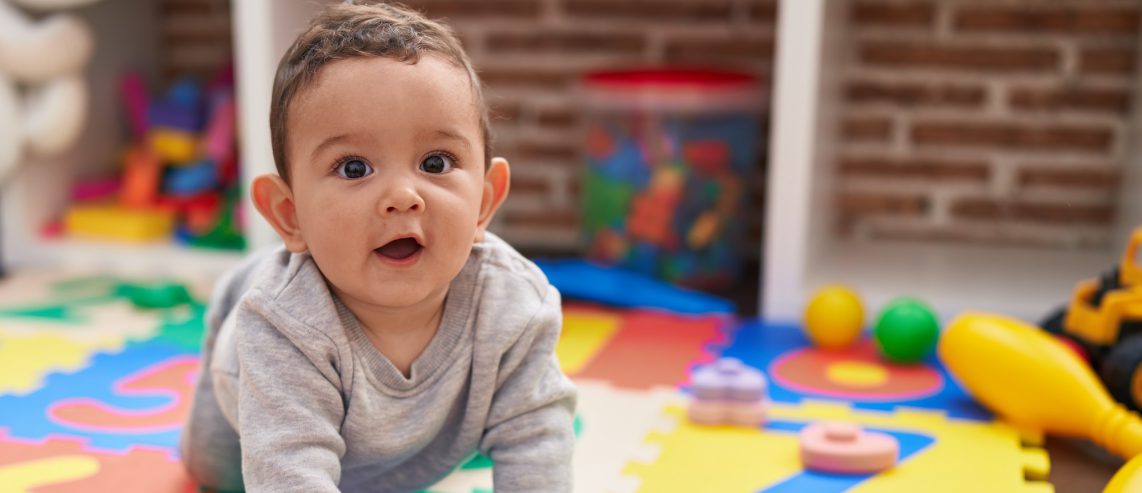Sometimes the signs of hearing loss in kids aren’t obvious. In babies and toddlers, hearing loss can cause delays in speech and other milestones. Hearing loss can cause older children to struggle in school.
That’s why it’s important to look out for signs of hearing loss in kids, even if your child passed their newborn hearing screening. Hearing loss can make it harder for your child to learn, understand others, and express themselves. If you see any signs of hearing loss, book a children’s hearing test as soon as possible.
If your child does have hearing loss, supports like hearing aids or other treatments can help. By improving your child’s hearing, you can foster their connections with others — and their learning. In some cases, an early response to hearing loss can ensure children don’t lose more of their hearing.
Signs of Hearing Loss in Babies
Almost all babies born in a hospital will have a newborn screening test. In this test, an expert places electrodes on the baby’s head, to measure brain signal responses to sound.
But babies may have mild hearing loss, or hearing loss of specific pitches, that the test misses. Or they may have a condition that causes hearing loss over time. If your baby shows any of the following signs, take them for a hearing test, even if they passed their newborn screening.
Signs of hearing loss in babies include:
- Not startling when hearing loud noises by one month of age.
- Not turning in the direction of sounds by four months of age.
- Seeming not to understand simple words like “bye bye” by nine months.
- Not making common speech sounds, such as “dada” or “baba,” by 10 months. (Instead, a baby with hearing loss may make gargling noises.)
Never Miss a Beat!
Subscribe to Our HealthBeat Newsletter!
Thank you for subscribing!
You can now select the specific newsletters you'd like to receive.
You are already subscribed.
Subscribe to more newsletters in our email preference center.
Sorry, an error occurred. Please try again later.
Get Healthy Tips Sent to Your Phone!
Signs of Hearing Loss in Toddlers
Children with hearing loss may not show symptoms until they are toddlers. This is when big leaps in language occur, so hearing problems can become more obvious. Testing and responding to a toddler’s hearing loss can prevent speech problems as they get older.
Signs of hearing loss in children include:
- Not responding to their name when called by 12 months.
- Not saying single words, like “mama” or “up” by 15 months.
- Not understanding simple phrases by 18 months, like “come here” or “do you want more?”
- Not being able to point to familiar body parts — like when you say “where’s my hand?” or “where’s my nose?” — by 18 months.
- Not saying at least five words by 18 months.
- Not saying short phrases like ‘all done’ by two years.
Signs of Hearing Loss in Pre-School and School-Age Children
Preschool and school-age children may have genetic hearing loss that gets worse as they grow. Exposure to loud noises, head injuries, or severe infections in childhood can also cause hearing loss. At this age, parents may think their child is choosing not to listen or pay attention, when hearing loss is the problem.
Signs of hearing loss in pre-school and school-kids include:
- Difficulty concentrating in school.
- Difficulty hearing certain sounds and words, but not others.
- Not following directions.
- Not responding when you call their name.
- Listening to television or music at a loud volume.
- Saying ‘huh?’ or ‘what?’ often.
- Speech problems, like mispronouncing words.
- Talking loudly.
- Turning their head in the direction of sound, as one ear may hear better than the other.
What to Do If You Notice Signs of Hearing Loss in Your Child
The first step is to go for a children’s hearing test. You can do this by getting a referral from your family doctor or pediatrician. Or you can book a test at an audiology center.
When booking, make sure the center offers hearing tests that will work for your child’s age.
An audiologist might look into your child’s ear, using a special scope with a light, to check for fluid. They will test your child’s hearing, using a test suited to your child’s age and level of communication.
Auditory brainstem response test
In this test, small sensors on the baby’s head measure the brain’s electrical responses to sounds. This test is painless. Like other hearing tests, it doesn’t come with any risks.
Otoacoustic emissions test
In response to sound, the hair cells in the inner ear vibrate as they send sound signals to the brain. This vibration produces small sounds.
In this test, the audiologist places a small device in in the ear that measures the sounds produced by the hair cells. It is ideal for babies and young children who may not be able to say if they heard a sound.
Audiometry test
This test is for older toddlers and children. Your child will listen to sounds through headphones or in a sound booth.
The audiologist will play tones, and your child will let the expert know if they heard the sound. They may press a button when they hear a sound, for instance.
Some centers can make the test into a game. For instance, your child may get to complete a puzzle on a tablet as they identify sounds.
The audiologist may also play words at various volumes. The tester will ask your child to repeat the words they hear.
These tests can show which pitches and volumes your child can — and cannot — hear. They help the audiologist decide if your child needs hearing technology, and if, so, what type they need.
Treatments For Hearing Loss in Kids
Hearing loss may be temporary, due to a build-up of fluid in the ear from an infection or ear drainage issue. Other times, the hearing loss is permanent. The treatments for hearing loss depend, in part, on whether the hearing loss is temporary or not.
Treating temporary hearing loss in children
Temporary hearing loss may require antibiotics to treat an infection. Your child’s doctor may want to follow up with you in weeks to months to see if the problem resolves. They may also suggest a procedure to insert tubes in the ear drums to help the fluid drain out.
Treating permanent hearing loss in children
Hearing loss that is permanent happens when the hearing nerve gets damaged. This can happen due to serious infections like meningitis, loud sounds, injury, or a genetic problem.
For permanent hearing loss, your audiologist will often recommend hearing aids. These work by amplifying sounds in the ear.
They can also lower or raise the frequency of sounds, as some children can’t hear high-pitched or low-pitched sounds.
Some hearing aids include technologies that reduce background sound or connect to a microphone on a teacher.
For children with very severe hearing loss, cochlear implants can help. These are devices that translate sounds into electrical signals, which the brain processes as sounds.
Both hearing aids and cochlear implants work best when they’re started as early as possible. That’s because the brain is more flexible when children are younger. That makes it easier for the brain to learn how to process sounds.
Sources
American Academy of Family Physicians. Hearing problems in children. Link
American Academy of Pediatrics. Hearing loss in children. Link
Centers for Disease Control. What is hearing loss in children? Link
Hearing Health Foundation. 10 clues your child has hearing loss. Link
National Library of Medicine. Hearing tests for children. Link
About Pediatrics
From nutrition to illnesses, from athletics to school, children will face many challenges growing up. Parents often will make important health care decisions for them. We hope to help guide both of you in that journey. UPMC Children’s Hospital of Pittsburgh is a national leader in pediatric care, ranking consistently on U.S. News & World Report’s Best Children’s Hospitals Honor Roll. We provide expert treatment for pediatric diseases, along well-child visits, urgent care, and more. With locations across Pennsylvania, Maryland, and West Virginia, you can find world-class care close to home. We also work closely with UPMC Magee-Womens Hospital, a national leader in care for newborns and their mothers. Our goal is to provide the best care for your children, from birth to adulthood and beyond. Visit our website to find a doctor near you.

